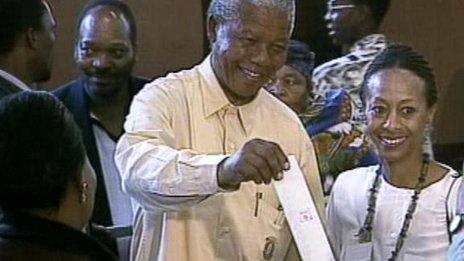South Africa: Does race matter in the 'rainbow nation'?
- Published

When Nelson Mandela became president of post-apartheid South Africa in 1994 he hoped to build a "rainbow nation"
The first generation of South African children born free of segregation have come of age this year.
Like modern South Africa, they have officially entered adulthood.
On 27 April 2012, the country marked the 18th anniversary of the first multi-racial elections that heralded the birth of the "rainbow nation".
These teenagers or "born frees" are now able to vote for the first time.
South Africa is not only one of the most diverse countries in the world, it is also one of the most unequal societies.
Poverty co-exists with great affluence and inequalities correlate with race.
According to the South African Institute of Race Relations, white per capita personal income is nearly eight times higher than that of black South Africans.
President Jacob Zuma recently sparked a debate when he called for greater state involvement in mining and land ownership to address inequalities inherited from apartheid - which he said pose a "grave threat" to Africa's biggest economy.
Nobel peace laureate and former South African president FW de Klerk waded into the debate warning of new racism in South Africa.
He said the governing African National Congress's rhetoric was increasingly becoming hostile to white South Africans.
"The Mandela and Mbeki era of reconciliation is over," he said.
"White males are quite unjustly blamed for the continuing triple crisis of unemployment, inequality and poverty."
Truly reconciled?
According to Mr de Klerk the ANC is using racism as a "smokescreen" to hide its failures.
The shooting last week by the police, of more than 30 striking mine workers in Marikana, has highlighted the growing frustration by South Africa's workers with poverty, unemployment and inequality.
So has the country truly reconciled? Can reconciliation be achieved without tackling inequality?
Are the country's affirmative action programmes achieving their objectives?
What about the "born frees" - what is their experience growing up in the new South Africa?
These are some of the questions BBC Africa Debate will be exploring in its next edition to be recorded and broadcast from Johannesburg South Africa on 31st August 2012.
You can join the debate via Twitter using #bbcafricadebate or @bbcafrica on Facebook and Google+
- Published8 June 2013
- Published9 July 2024
